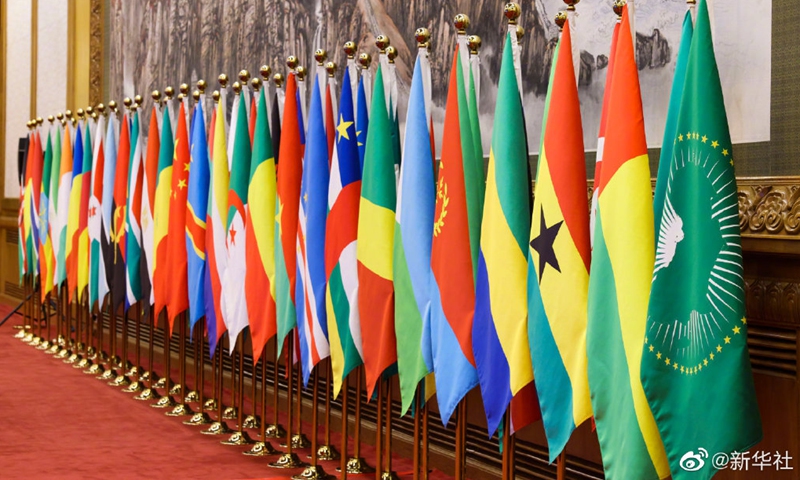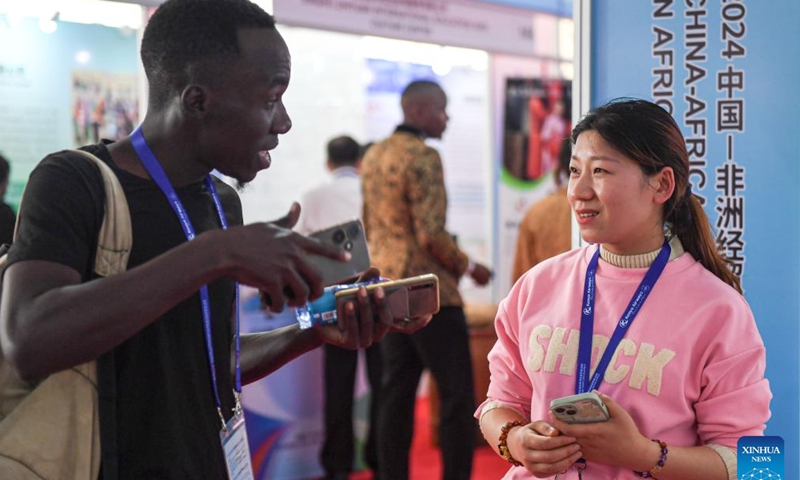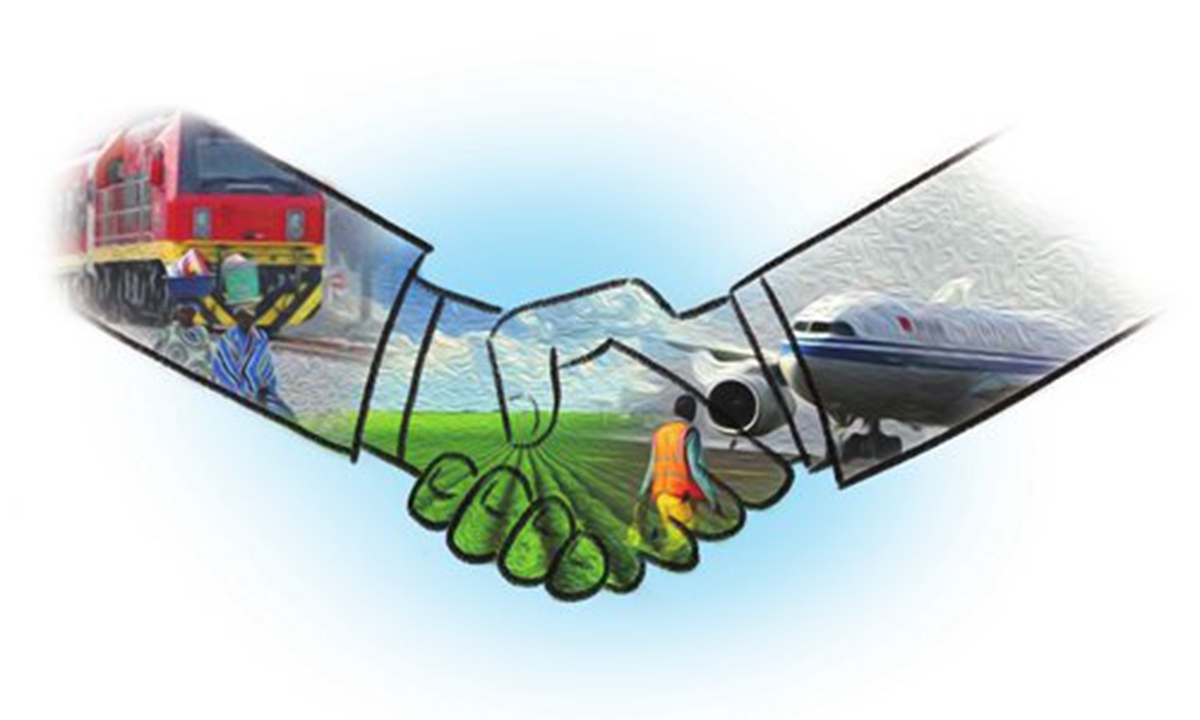IN-DEPTH / IN-DEPTH
China-Africa Rhapsody: Chinese experts share tech, expertise to help African farmers boost production, food security
Seeds of hope
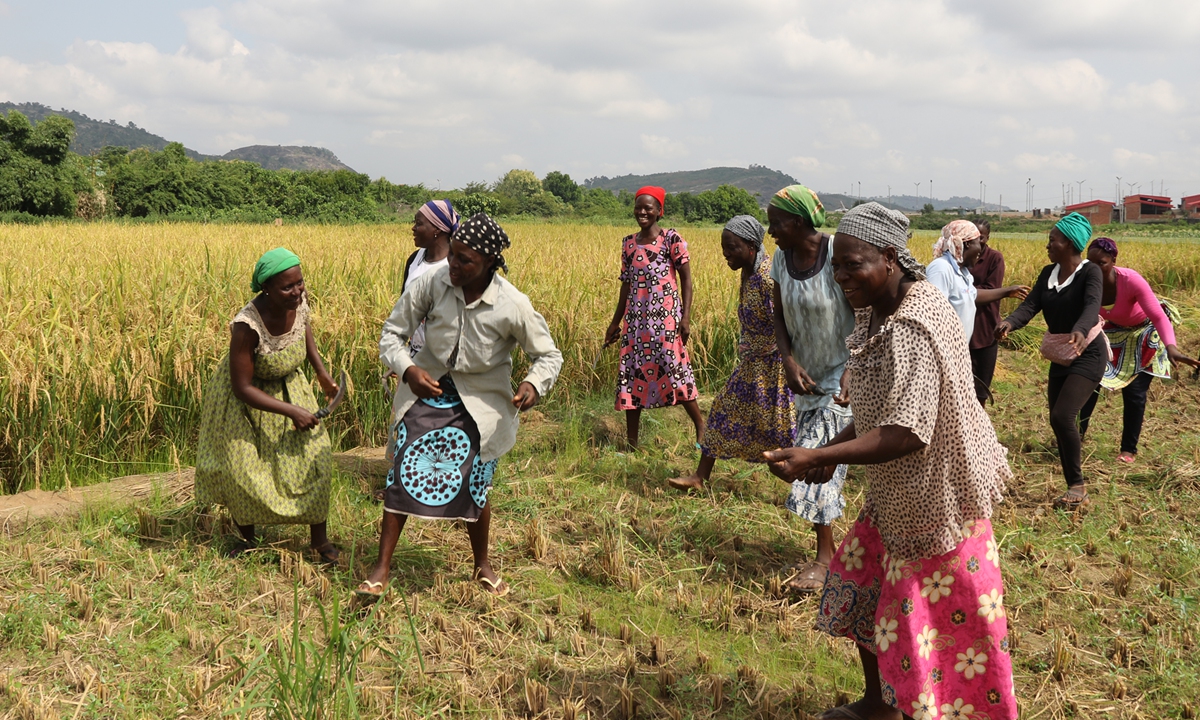
Local farmers celebrate the harvest in a demonstration area in Nigeria in 2022. Photo: Courtesy of Xu Jianlong
Editor's Note:Friendly exchanges between China and Africa have enjoyed a long history and have deepened in recent years, covering various fields such as politics, the economy, and culture. The Global Times is launching a China-Africa Rhapsody series, aiming to showcase the profound human connections and development visions between the two peoples by sharing the true stories of Chinese people in Africa and African people in China. From touching stories of China-Africa cooperation and exciting collisions of youthful ideas, to debunking fallacies concocted by some Western sources about the China-Africa collaboration, this series hopes to promote closer cooperation and deeper understanding between the peoples of China and Africa.
In this installment, we turn our attention to Chinese agricultural experts who have been actively collaborating with African countries to improve local rice cultivation techniques, significantly boosting agricultural productivity. This cross-continental partnership exemplifies a commitment to global food security and highlights the importance of international cooperation in fighting against hunger and achieving sustainable agricultural development.
Around 733 million people - meaning one in 11 people worldwide - had to go to bed hungry in 2023, with a significant number from Africa where one in five individuals face this plight, according to the Food and Agriculture Organization of the United Nations' latest figures.
In the face of this persistent challenge, the cycle of hunger and poverty continues to deepen, exacerbating the issue. To combat chronic hunger in Africa, Chinese professor Xu Jianlong at the Crop Science Research Institute of the Chinese Academy of Agricultural Sciences has embarked on a mission to fight against hunger by empowering smallholder farmers and households to boost their agricultural production.
Since 2008, Xu, together with a group of Chinese researchers, has managed to use genetic molecular research to breed Green Super Rice (GSC) that can be grown in the resource-poor regions of Africa, with support from the Chinese government and the Bill & Melinda Gates Foundation.
When it comes to solving the difficult problem of hunger and alleviating poverty, China is undoubtedly a good forerunner. The country announced in 2021 that extreme poverty had been eradicated and it has lifted nearly 800 million people out of poverty over the last four decades. Agricultural development was used as an effective way to lift people out of poverty. Therefore, China has valuable lessons to share.
According to Xu, they have been busy breeding different GSR varieties to adapt to different ecological environments. In Africa, for example, the GSR varieties need to be more resilient to drought and high temperatures.
"It's important to teach them 'how to breed rice' instead of just 'giving them rice,'" Xu told the Global Times.
One step further
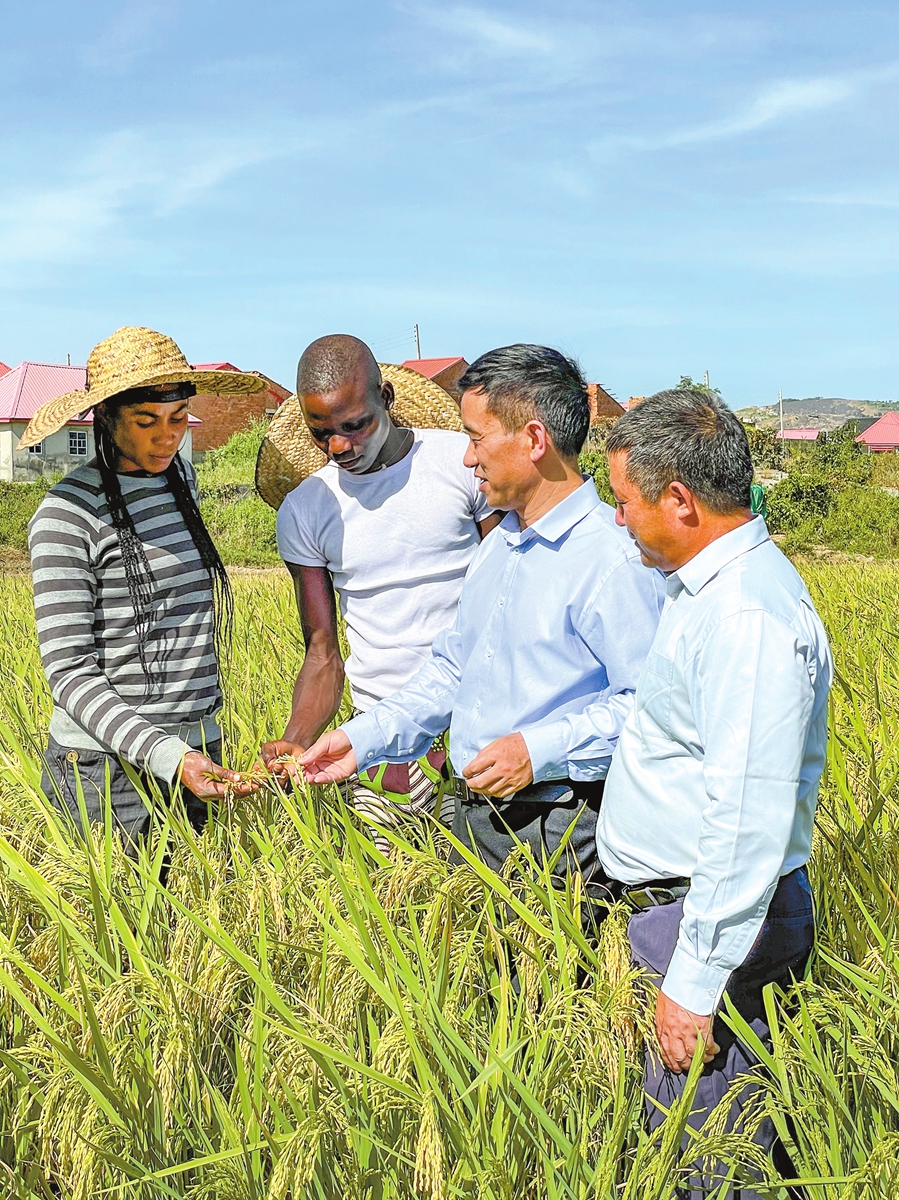
Xu Jianlong guides Nigerian technicians on how to select seeds in the field in 2022. Photo: Courtesy of Xu Jianlong
Over the last decade, Xu and his colleagues have successfully developed 236 excellent rice varieties, with nearly 6,000 imported materials being tested and screened in different countries in Africa and Asia. Ninety-six GSR varieties have been approved or registered, with a promotion area of 6.12 million hectares, helping farmers increase their income by $1.4 billion, Xu introduced.During his work in Africa, he noticed that farmers living in remote and scattered areas have difficulties accessing good quality seeds, which greatly influenced their rice yields.
"People often say that a single seed can change the world. We believe that it is more important to get these seeds into the hands of smallholder farmers, plant them in the soil, and only then can there be subsequent harvests and celebrations," he said.
It is for this reason that Xu is collaborating with the Gates Foundation to jointly decide on the next step forward after developing GSR. In September 2021, they launched a program to promote the construction of the rice seed industry system in West African countries through a dual-track approach, from upstream breeding and seed production to downstream seed promotion and marketing, forming a complete chain. They first piloted the scheme in West African countries and established rice demonstration areas in Nigeria and Mali.
To appeal to local farmers, they first rented large demonstration farmlands to plant the developed GSR and the most widely planted local varieties side by side. When the rice matured, they invited nearby small-scale farmers to witness the harvest of both types of rice. They weighed the results on the spot, showing that the hybrid rice varieties could increase yields by more than 50 percent.
"The farmers were amazed. Furthermore, we distributed seeds for free on-site, giving two pounds to each invited farmer, encouraging them to plant the seeds," Xu said.
For West African farmers, their primary concern is yields, so Xu's team brought high-yielding and stress-resistant rice varieties for local cultivation. But after actual inspections, they found that farmers also had their own preferences for rice taste, preferring long-grain aromatic rice. Therefore, they introduced hybrid rice varieties that are high-yielding, long-grain, and aromatic, which the farmers liked and more easily accepted.
However, the road has not been that smooth. In the GSR breeding project, they initially imported developed varieties from China to countries like Nigeria for testing, hoping to find seeds suitable for local cultivation in Africa. But African soil and climatic conditions are very different from China's, and out of 100 varieties they brought over for testing, only a few - one to two varieties - succeeded.
Besides, Xu noted that even the same rice variety, for example, may produce different results in experimental fields and farmers' fields due to differences in water and fertilizer conditions. Because smallholder farmers find it difficult to plant rice in the same way as in the experimental controls, optimally controlling all the water and fertilizer conditions and using the most suitable pesticides. Therefore, even if a variety can increase yields by up to 50 percent in experimental fields, it may only increase yields by 20 percent in farmers' hands, a difference that must be considered.
"It is important to start from reality. Like breeding work, projects must consider local temperature and light conditions and work in real environments," he said.
"We must always consider the actual situation in farmers' fields and their actual needs, which places more specific requirements on our breeding work," Xu told the Global Times.
Lesson to share
Over the last 40 years, China has made significant progress in agricultural development, which has not only ensured China's food security but also laid a strong foundation for the sustainable development of Chinese agriculture. This path of agricultural development that benefits smallholder farmers has great significance for Africa, where smallholder farmers are also the mainstay.
Xu told the Global Times that after finding the most appropriate seeds, it is more important to help locals master breeding and planting methods.
To do this, they worked closely with local technical experts to pass on breeding knowledge, hybrid rice seed production, and high-yield cultivation techniques, allowing them to achieve self-breeding and food self-sufficiency. They also went into the fields to observe how farmers planted rice and helped them find specific skills on how to water, fertilize, and spray pesticides during different rice growth seasons.
"Only by giving people the ability to sustain themselves can sustainable development be achieved," Xu said.
In addition to rice planting, China and Africa have established extensive cooperation in the agricultural sector under multiple mechanisms including the Belt and Road Initiative (BRI).
In an interview with the Xinhua News Agency, Felix Dapare Dakora, former president of the African Academy of Sciences, noted, "Learning from China is the right path." He hailed China's great achievements in solving food shortages through technological innovation and China's efforts to help Africa strengthen food security.
Recently, experts from the China Agricultural University participated in an international agricultural expo in Tanzania. The red slogans in both Chinese and English reading "Harvesting Festival for Small Technology Big Harvest" at the scene.
Li Xiaoyun, a professor at the China Agricultural University, told The Beijing News that they arrived in Tanzania 10 years ago and found that the local corn yield was very low. Traditional Chinese corn planting techniques could help local farmers increase their production rapidly without incurring higher investment costs.
Initially, they promoted the technology in one local village and now the program has been expanded to 10 villages, helping to increase local farmers' corn yield two- to five-fold. They also assisted local families in trying corn and soybean intercropping, producing soybeans, and making soy milk and other soy products by themselves, to solve the problem of nutritional deficiencies in the local area, read the report.
Meanwhile, the training of African experts is ongoing. According to the China Agricultural University website, the "China-Africa Science and Technology Backyard" is a China-Africa agricultural education project launched in 2019, implemented by the China Agricultural University, which recruits agricultural students from Africa to study in China.
It uses China's agricultural experience to help Africa cultivate high-quality agricultural talents and promote the development of African agriculture. The project has experimental bases in Quzhou County, Hebei Province, and Malawi. Over the last six years, the project has recruited 91 agricultural talents from 12 countries in Africa. These students have also become builders and witnesses of the deepening cooperation between China and Africa. The feedback from farmers showed that they have benefited a lot from the training, which greatly increased their production yields, according to the university.
Xu's lab also provided advanced training regarding GSR breeding techniques to about 942 scientists and technicians from 15 countries and this training program continues to expand.
"The use of Chinese technology to ensure food security in developing countries is of great importance to BRI construction and the building of a global community of shared future," Xu said, eyeing the promotion of techniques to help African farmers in more countries in the future.
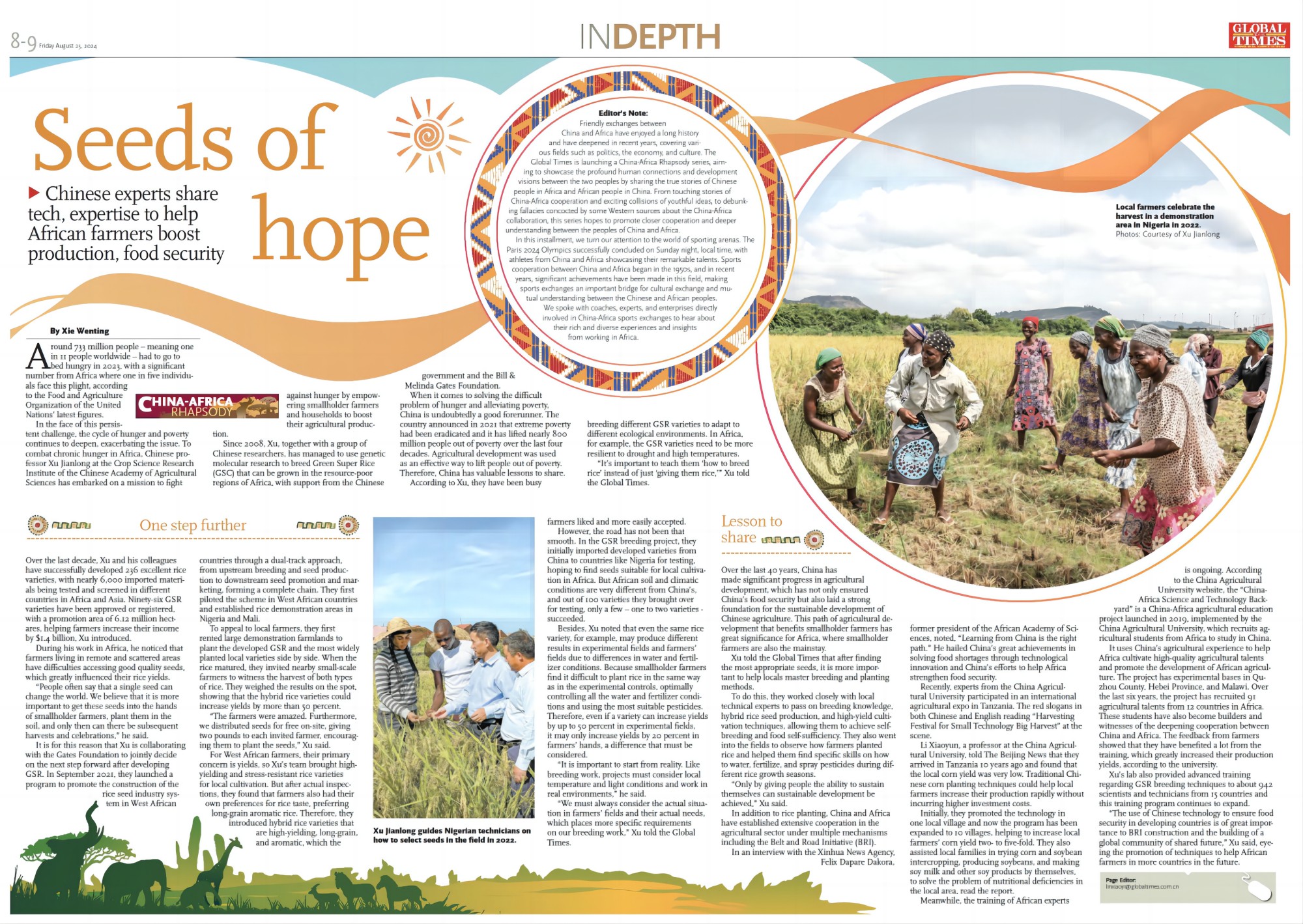
Seeds of hope
